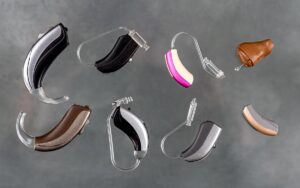You Know when you’re viewing an action movie and the hero has a loud explosion nearby and their ears begin to ring? Well, guess what: that most likely means our hero suffered at least a mild traumatic brain injury!
To be certain, brain injuries aren’t the bit that most action movies linger on. But that ringing in our hero’s ears signifies a condition called tinnitus. Usually, hearing loss is the topic of a tinnitus conversation, but traumatic brain injuries can also cause this condition.
Concussions, after all, are one of the more prevalent traumatic brain injuries that occur. And they can happen for many reasons (car crashes, sports accidents, and falls, for instance). How something such as a concussion triggers tinnitus can be, well, complicated. Luckily, treating and managing your conditions is typically very attainable.
What is a concussion?
A concussion is a specific kind of traumatic brain injury (TBI). One way to think about it is that your brain is protected by sitting snuggly in your skull. When something occurs and shakes the head violently enough, your brain starts moving around inside of your skull. But your brain could end up crashing into the inside of your skull because of the little amount of extra space in there.
This causes damage to your brain! Multiple sides of your skull can be hit by your brain. And this is what causes a concussion. When you visualize this, it makes it simple to understand how a concussion is literally brain damage. Symptoms of concussions include the following:
- Headaches
- Confusion and loss of memory
- Nausea and vomiting
- Ringing in the ears
- Slurred speech
- Blurry vision or dizziness
- A slow or delayed response to questions
Even though this list makes the point, it’s certainly not exhaustive. Several weeks to several months is the normal duration of concussion symptoms. Brain damage from a single concussion is generally not permanent, most individuals will end up making a complete recovery. But recurring concussions can cause irreversible brain damage.
How do concussions trigger tinnitus?
Can a concussion mess with your hearing? Really?
It’s an interesting question: what is the connection between tinnitus and concussions? After all, concussions are not the only brain traumas that can trigger tinnitus symptoms. Even minor brain injuries can lead to that ringing in your ears. Here are a couple of ways that may happen:
- Disruption of communication: Concussion can, in some cases, harm the portions of the brain that manage hearing. When this occurs, the signals that get transmitted from your ear can’t be correctly dealt with, and tinnitus may occur consequently.
- Meniere’s Syndrome: A TBI can cause the onset of a condition called Meniere’s Syndrome. This is a result of an accumulation of pressure within the inner ear. Sooner or later, Meniere’s syndrome can result in significant tinnitus and hearing loss.
- Damage to your hearing: For members of the military, TBIs and concussions are often caused by distance to an explosion. And explosions are incredibly loud, the noise and the shock wave can damage the stereocilia in your ear, causing hearing loss and tinnitus. So it’s not so much that the concussion brought about tinnitus, it’s that the tinnitus and concussion have a common root cause.
- Nerve damage: There’s also a nerve that is responsible for transmitting sounds you hear to your brain, which a concussion can damage.
- A “labyrinthine” concussion: This kind of concussion happens when the inner ear is injured as a result of your TBI. Tinnitus and hearing loss, due to inflammation, can be the result of this damage.
- Interruption of the Ossicular Chain: The transmission of sound to your brain is aided by three tiny bones in your ear. A substantial impact (the kind that can trigger a concussion, for instance) can jostle these bones out of position. Tinnitus can be caused by this and it can also interrupt your ability to hear.
It’s important to emphasize that every traumatic brain injury and concussion is a bit different. Individualized care and instructions, from us, will be provided to every patient. Certainly, if you think you have suffered a traumatic brain injury or a concussion, you need to call us for an evaluation right away.
When you suffer from a concussion and tinnitus is the consequence, how can it be managed?
Typically, it will be a temporary situation if tinnitus is the result of a concussion. How long does tinnitus linger after a concussion? Well, it could last weeks or months. However, if your tinnitus has lasted for more than a year, it’s likely to be permanent. In these cases, the treatment plan changes to managing your symptoms over the long term.
This can be achieved by:
- Hearing aid: Sometimes, tinnitus becomes dominant because the rest of the world takes a back seat (as is the case with non-TBI-caused hearing loss, everything else gets quieter, so your tinnitus sounds louder). Hearing aids help your tinnitus fade into the background by turning the volume up on everything else.
- Therapy: In some situations, therapy, including Cognitive Behavioral Therapy (CBT) can be used to help patients disregard the noise produced by their tinnitus. You disregard the sound after acknowledging it. This technique takes therapy and practice.
- Masking device: This device goes inside your ear a lot like a hearing aid, but it produces particular noises instead of making things louder. This noise is custom tailored to your tinnitus, drowning out the sound so you can pay attention to voices, or other sounds you really want to hear.
In some cases, additional therapies may be necessary to achieve the desired result. Management of the root concussion may be required in order to make the tinnitus go away. The correct course of action will depend on the nature of your concussion and your TBI. This means an accurate diagnosis is incredibly important in this regard.
Talk to us about what the right treatment plan may look like for you.
You can control tinnitus caused by a TBI
A concussion can be a significant and traumatic situation in your life. When you get concussed, it’s a bad day! And if your ears are ringing, you may ask yourself, why are my ears ringing after a car accident?
Tinnitus may surface instantly or in the following days. However, it’s essential to remember that tinnitus after a head injury can be successfully managed. Contact us today to schedule an appointment.
[blogcta]





